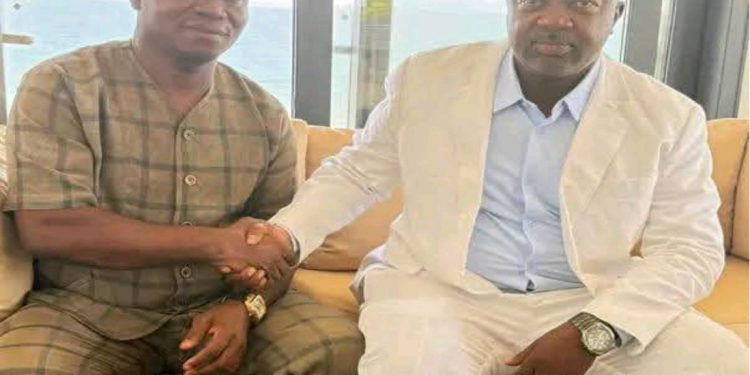By Hassan Osman Kargbo
In a landmark step towards peace and collaboration within Sierra Leone’s football community, Babadi Kamara, Executive Chairman of Bo Rangers; and Thomas Daddy Brima, President of the Sierra Leone Football Association (SLFA), met to engage in crucial peace talks. The meeting, facilitated by Jimmy Batilo Songa, marks a turning point in resolving ongoing tensions that have hindered progress within the country’s football landscape.
The Peace talks, which took place at a neutral venue, came on the heels of recent disagreements at the Saturday Ordinary Congress held at Radisson Blu. Tensions had sparked division and uncertainty within the football family, with key stakeholders expressing concerns about the future direction of the sport in Sierra Leone. The dialogue, however, offered a glimmer of hope for reconciliation and the restoration of unity within the football community.
Both Kamara and Brima expressed a shared commitment to prioritizing the growth and development of football in Sierra Leone, emphasizing that the sport should act as a unifying force rather than a source of division. Their joint statement marked a historic moment, as they put aside personal and organizational differences for the greater good of the game and the nation.
“The future of Sierra Leonean football is bigger than any one individual or club,” Kamara said during the meeting. “Our goal is to create an environment where football thrives, where players, coaches, and fans are united in the pursuit of excellence. We must not allow our differences to derail the progress we’ve made, or the potential that lies ahead.”
For his part, Brima echoed Kamara’s sentiment, reaffirming the SLFA’s role in overseeing the development of the sport across all levels in Sierra Leone. “Football is a powerful tool for social change, unity, and national pride. It has the ability to bring people together regardless of background, ethnicity, or political affiliation,” Brima said. “This meeting is a testament to the willingness of the leadership to work together; and I am confident that this dialogue will serve as the foundation for a new chapter in Sierra Leonean football.”
The main outcome of the peace talks was the mutual agreement to prioritize football development above all else. Both leaders emphasized that the game should be a platform for social cohesion, bringing people from all walks of life together. They urged all stakeholders within the football community—including players, coaches, officials, and supporters—to remain calm and united, focusing on the shared goal of advancing the sport in Sierra Leone.
“It’s time for us to put the interests of football above everything else,” Kamara added. “Football has the potential to unite this country in ways that few other things can. We need to focus on that, and let go of any distractions or divisions that have been preventing us from achieving our true potential.”
Brima also spoke on the importance of collaboration and the need for a transparent, accountable football administration. “We are committed to building an environment where everyone feels valued and where the integrity of the game is upheld,” he stated. “This peace talk is just the beginning, and we are prepared to engage all stakeholders in a meaningful and constructive way.”
Both leaders acknowledged that the road ahead would not be easy, but they expressed optimism that, with continued dialogue and a shared vision for progress, Sierra Leone’s football community could overcome its challenges. They stressed that the ultimate goal is not just the success of the national team but the development of football at the grassroots level, ensuring that young players across the country have access to the opportunities and resources needed to thrive.
In addition to focusing on unity and collaboration, the talks also addressed the need for improved governance, better facilities, and enhanced support for local clubs. Kamara and Brima agreed that it is essential to establish a strong foundation for the future of Sierra Leonean football, which includes investing in youth development programs, improving infrastructure, and ensuring that all players and officials are treated with respect and fairness.
The peace talks were widely praised by stakeholders within the football community, with many expressing hope that such would lead to a new era of cooperation and development for the sport in Sierra Leone. Fans, players, and coaches alike have longed for a cohesive and forward-thinking leadership structure, and meeting offered a promising glimpse into a more harmonious future for Sierra Leonean football.
As both Kamara and Brima committed to work together for the betterment of the game, it is clear that the peace talks represent a significant step in the right direction.
The message from both leaders was clear: football in Sierra Leone must remain a unifying force, with the ultimate goal of creating a thriving, successful, and inclusive footballing environment for all.













